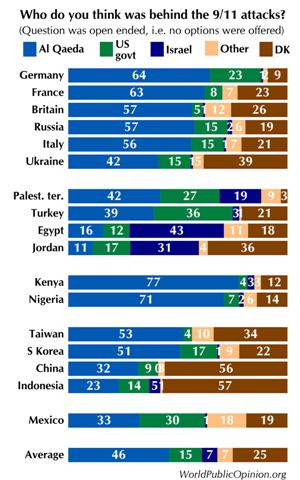 An international poll released last week shows that there is no consensus outside the United States about who was behind the terrorist attacks of September 11, 2001. From the press release:
An international poll released last week shows that there is no consensus outside the United States about who was behind the terrorist attacks of September 11, 2001. From the press release:
“A new WorldPublicOpinion.org poll of 17 nations finds that majorities in only nine of them believe that al Qaeda was behind the 9/11 terrorist attacks on the United States.
In no country does a majority agree on another possible perpetrator, but in most countries significant minorities cite the US government itself and, in a few countries, Israel. These responses were given spontaneously to an open-ended question that did not offer response options.
On average, 46 percent say that al Qaeda was behind the attacks while 15 percent say the US government, seven percent Israel, and seven percent some other perpetrator. One in four say they do not know.”
This is shocking. How are we to muster support from our allies to fight against Islamic extremism if some of their own citizens doubt who and why we are even fighting? Sure, these folks would probably agree that terrorism is bad, but it sounds like we may have some difficulty agreeing on who the terrorists actually are.
What to do? How do we adjust people's disparate versions of the truth? Wait there's more, again from the press release:
“Though people with greater education generally have greater exposure to news, those with greater education are only slightly more likely to attribute 9/11 to al Qaeda. A stronger correlate of beliefs about 9/11 are respondents’ attitudes about the United States. Those with a positive view of America's influence in the world are more likely to cite al Qaeda (on average 59%) than those with a negative view (40%). Those with a positive view of the United States are also less likely to blame the US government (7%) than those with a negative view (22%).”
In short, a person's view of the US affects how they interpret the US's narrative, or story. If people don't believe the US’ “we’ve been attacked, now we must retaliate” narrative, they are more likely to interpret the "war on terror" as one big act of aggression. This then bolsters their negative views of the US in the first place, and it just becomes a vicious cycle that continuously turns perception into reality.
[This is why I get so irked when people cast aside negative views of the US as unimportant, wrong, simply “a beauty contest,” or”fluff.” There is much more to these attitudes than just good versus bad. They are just the tip of the iceberg.]
Public Diplomacy has, as its stated goal, “Engaging, informing, and influencing key international audiences." The slogan for America.gov, the department's online portal for engaging international audiences, is "Telling America's Story". Clearly, out of all government agencies, the burden of countering these misperceptions falls on the PD department. Here's one example of how they are already doing so.
But there is clearly much more work to be done. At a blogger roundtable today, I asked Under Secretary for Public Diplomacy James K. Glassman the question at hand: how do we use public diplomacy tools to address the problem of 9/11 denial?
His answer was less than satisfying. He reacted by saying that the above findings show what he and his team are "up against," but didn't offer any constructive measures on how to deal with the problem. Perhaps if he had been given more time to respond he would have crafted a more complete answer
Clearly there is much work to be done in the credibility-building department. This will take time‚ much more time than it took us to tarnish our reputation (remember when, on September 12, 2001, the international headlines read "We are all New Yorkers"). Let's hope that our Public Diplomacy bureau‚ our chief international persuader‚ can sharpen the tools in its box and take on the US image problem and the misperceptions it can foster.
For another take on this poll form a veteran public diplomacy-watcher, click here. Here is another veteran public diplomacy watcher who disagrees with me. Also, here is more bad news.